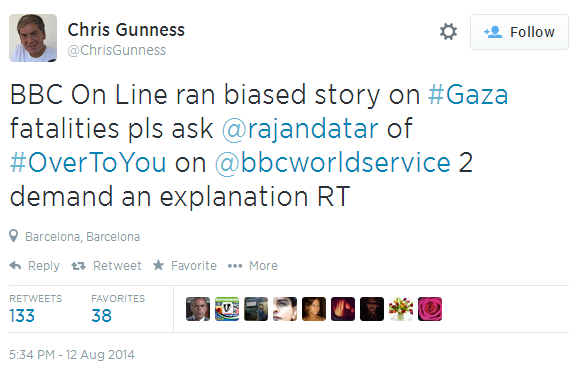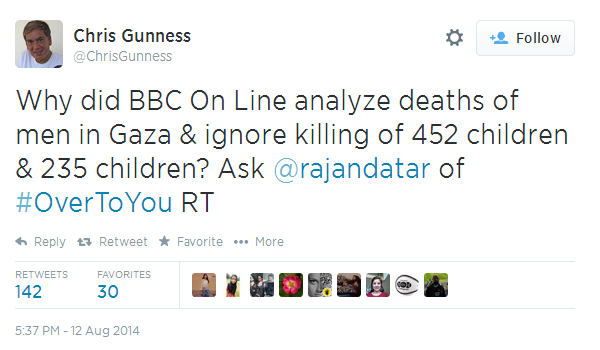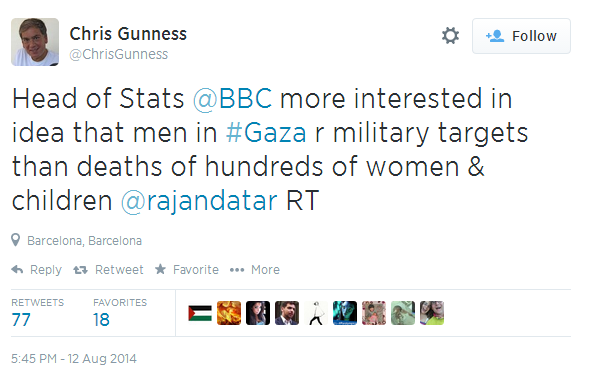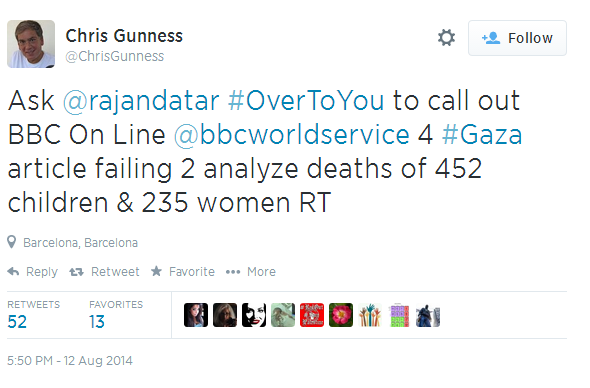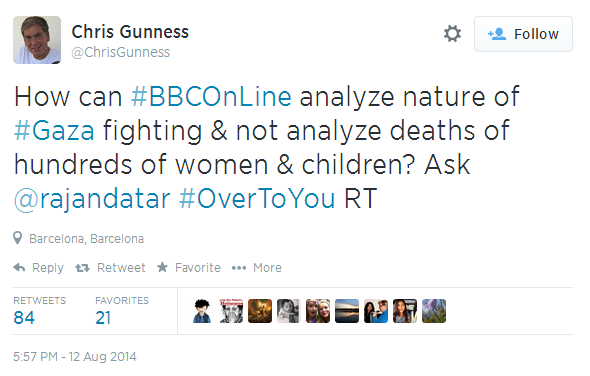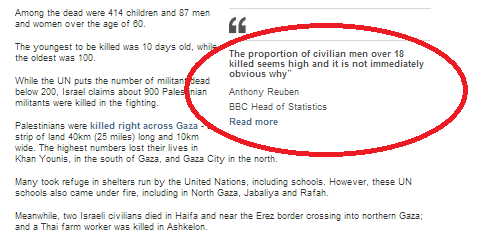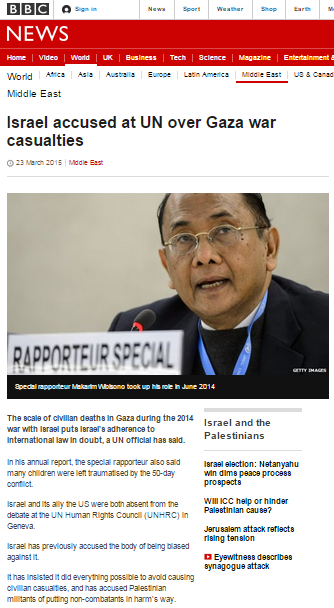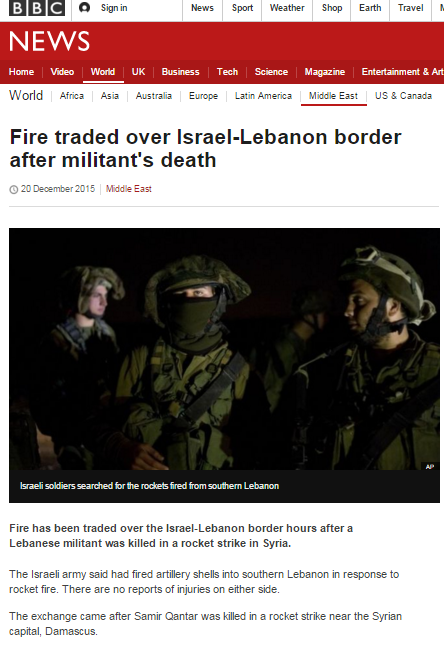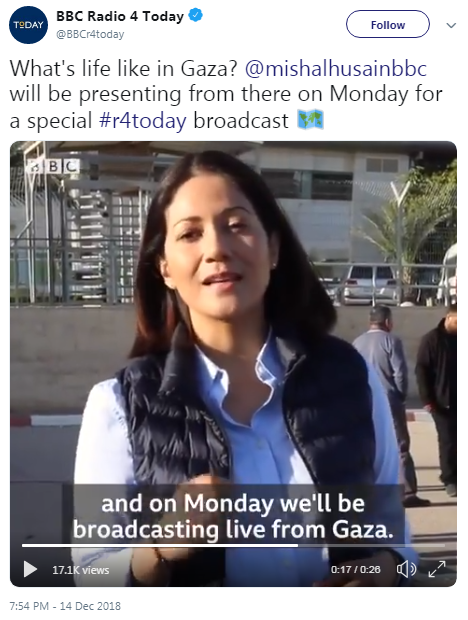Readers no doubt recall that on August 8th an article titled “Caution needed with Gaza casualty figures” by BBC News’ head of statistics appeared on the BBC News website.
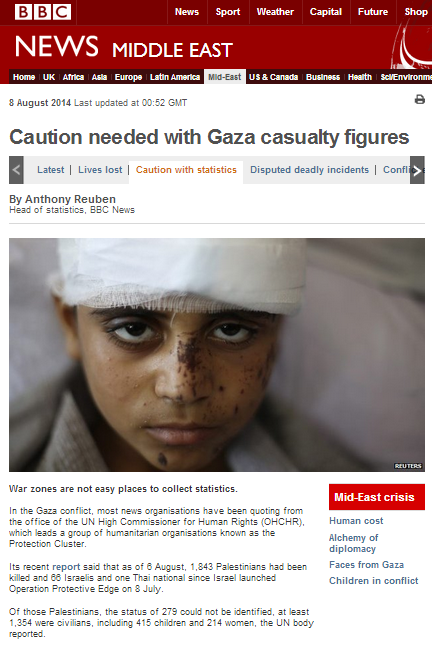
Since its initial appearance, that article has undergone a series of alterations – including its date stamp – but no footnote has been appended to inform readers of the changes made.
The most significant change to Anthony Reuben’s article is the disappearance of the following line:
“Nonetheless, if the Israeli attacks have been “indiscriminate”, as the UN Human Rights Council says, it is hard to work out why they have killed so many more civilian men than women.”
In the article’s latest version, that sentence was replaced by this one:
“Nonetheless, the proportion of civilian men over 18 killed seems high and it is not immediately obvious why.”
The final version of the article also includes the following passage which did not appear in earlier versions:
“Many factors could have contributed to high fatality numbers among men aged 20 to 29.
Jana Krause, from the war studies department at Kings College London, says: “A potential explanation other than combatant roles could be that families expect them to be the first ones to leave shelters in order to care for hurt relatives, gather information, look after abandoned family homes or arrange food and water.
“Similar to combatant roles, these would be ‘high-risk’ social roles that young men are often expected to fulfil.”
She stressed that more work would be needed on the ground to determine why this group was over-represented in the casualty figures.
Men of this age may also be mistaken for fighters because they fit the age profile.”
Another addition to the article’s latest version was this:
“It should be said that while Hamas said only 50 fighters had been killed in 2008-09, some human rights groups operating in Gaza were reporting considerably higher figures.
The point is that it is hard to say with certainty at this stage how many of the dead in Gaza are civilians and how many were fighters. This is in no sense the fault of the UN employees collecting the figures – their statistics are accompanied by caveats and described as preliminary and subject to revision.”
The second paragraph above originally read:
“In conclusion, we do not yet know for sure how many of the dead in Gaza are civilians and how many were fighters. This is in no sense the fault of the UN employees collecting the figures – their statistics are accompanied by caveats and described as preliminary and subject to revision.”
Clearly somebody was unhappy with the wording of certain parts of that article. Notably, the reference to the UN Human Rights Council and the doubt expressed regarding that organisation’s allegations of “indiscriminate” Israeli attacks has been completely erased. In addition, passages have been added and wording changed in a very transparent attempt to create the impression that the over-representation of young men among the casualty figures in the Gaza Strip might not be the result of their being members of terrorist organisations, but because they popped out to the corner shop to buy milk.
The bulk of the changes to this article are dated August 11th. However, the UNWRA spokesman Chris Gunness sent a series of consecutive Tweets apparently relating to the same article which are date-stamped August 12th.
Gunness’ final Tweet in that series was this one:
In addition to Anthony Reuben’s article, readers will recall that an additional one also appeared on the BBC News website on the same morning of August 8th under the title “Gaza conflict: The hundreds who lost their lives“. Notably, whilst the former article no longer appears on the BBC News website’s Middle East page, the latter one does. Whilst the inaccuracies concerning Israeli casualties in that article have not been corrected, another undocumented stealth change has been made.
In the article’s original version, that quote was different to the format in which it appears now: it originally quoted Reuben’s above reference to the UN Human Right Council’s allegations of “indiscriminate” attacks.
So perhaps the BBC would like to clear up this little mystery for us. Why were those changes made three days after the article was published? Why is there no notification to readers that amendments have been made? Why has all mention of the UN HRC been expunged from this article and why have efforts – albeit very clumsy ones – been made to change the ‘take-away’ message to BBC audiences regarding the over-representation of men of fighting age among the Gaza casualty figures?
And of course one other very obvious question remains: who is pulling the BBC’s strings?

